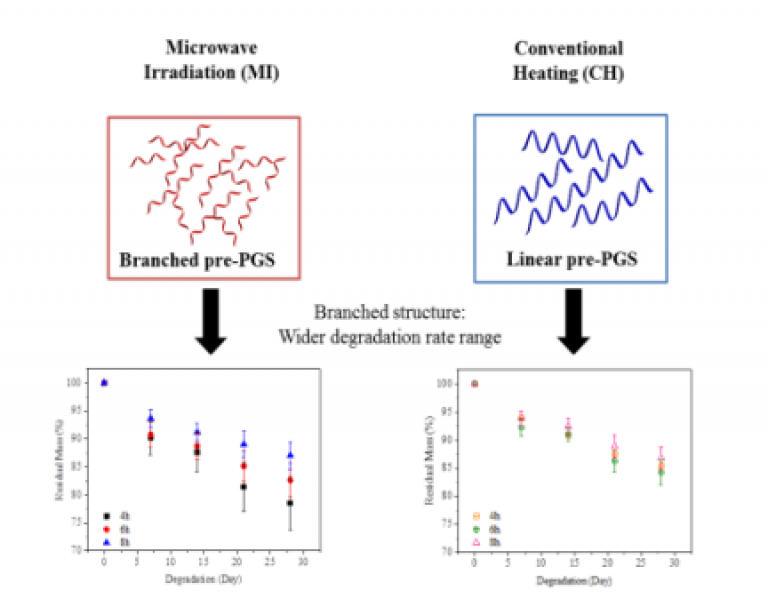New Paper in Polymer Chemistry
12 June 2017
We are pleased to announce a new paper entitled "Tailoring Degree of Esterification and Branching of Poly(glycerol sebacate) by Energy Efficient Microwave Irradiation" published by our group member Chi Ching Lau et.
 al in Polymer Chemistry.
al in Polymer Chemistry.
It is will available online soon.
Abstract
Poly(glycerol sebacate) (PGS) is known as an exciting biomaterial owing to its tunable mechanical properties and controllable degradation rate. However, it is always challenging to control these properties. In this study, we have proposed a solvent-based system to provide a better control of reaction temperature in microwave which can minimize the evaporation of monomers and water was collected to control the degree of esterification. Pre-PGSs with varied degree of esterification were prepared using both single mode and multimode microwave irradiation (MI) in this solvent-based reaction system. For similar degree of esterification of pre-PGS, the reaction time was almost halved with a better control on mechanical property by single mode MI compared to multimode MI. Furthermore the single mode MI approach was compared with the conventional heating approach (CH). The mechanical properties and degradation rate of PGSs can be controlled readily by using single mode MI approach compared with CH, which are crucial for its application as a biomaterial. It has been found that the single mode MI not only accelerates the pre-polymerisation process rate by six times, but also speeds up the curing time to the same extend. The Young's Modulus of PGSs prepared by single mode MI is increased from 0.77 to 3.14 MPa when the degree of esterification is 66.82%, which is 50% higher than that reported in literature. Furthermore, PGS using highly branched pre-PGS prepared by single mode MI method can easily tune the flexibility. It can achieve much higher Young's Modulus than that obtained by CH with a short curing time (< 10 hours). In addition, the residual mass of PGSs prepared by single mode MI is varied from 78.54 % to 92.96 % compared to CH method that ranging from 84.24 % to 93.31 %. Thus, these highly branched PGSs produced by single mode MI also show a wider degradation window (approximately 59 % higher degree of flexibility than CH method), which is found to be highly dependent on the degree of esterification and curing time of pre-polymer, and controlled by branching.
 Close
Close

